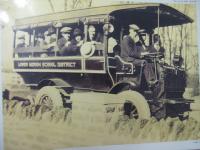Want to learn about the history of education? Or how to teach people about history? Or how to run an effective community-based educational project? Go to the Lower Merion Historical Society, son, and get yourself schooled.
The Lower Merion Academy, in the Main Line suburb of Bala-Cynwyd, was one of the first public schools in the United States when it was established in 1812. Two centuries later, the building is still being used for educational purposes by the Lower Merion Historical Society. And if you want to learn about alllllllllll of the various schools that have existed in the school district during the intervening period, look no further. In addition to some original minute books from the school board, the historical society boasts a tremendous collection of ephemera, photographs, newspapers, yearbooks, and more, from just about every school that has ever operated in the district. These materials will be particularly useful to local historians and genealogists already interested in particular schools. But more than that, the holdings as a whole tell a broader story about the institutionalization of education and the birth of the public school system, as well as the development of one school district in the changing contexts of national wars, desegregation, and other social movements.
 My favorite school-related collection at the Lower Merion Historical Society is the Russell Byerley Memorial World War II Collection. Russell Byerley, a woodshop teacher at Lower Merion Senior High School, solicited letters and photographs from his former students who entered military service during World War II. The resulting collection, which spans 7.4 linear feet, provides an overview of soldiers' experiences that is both intimate and varied. Some letters are humorous, some are heart-breaking, and all provide fascinating insights into the lives of servicemen and servicewomen during the war.
My favorite school-related collection at the Lower Merion Historical Society is the Russell Byerley Memorial World War II Collection. Russell Byerley, a woodshop teacher at Lower Merion Senior High School, solicited letters and photographs from his former students who entered military service during World War II. The resulting collection, which spans 7.4 linear feet, provides an overview of soldiers' experiences that is both intimate and varied. Some letters are humorous, some are heart-breaking, and all provide fascinating insights into the lives of servicemen and servicewomen during the war.
Whether you're interested in using the Lower Merion Historical Society's school-related collections or any of their other valuable resources, their well-managed and easily-accessible holdings make research a pleasure. We were blown away by the historical society's excellent website (http://www.lowermerionhistory.org/), which offers full-text keyword searches and online access for some of their most frequently-requested materials. These guys know a thing or two about cataloging! The Lower Merion Historical Society's holdings don't languish in some vault--the (all-volunteer) staff is committed to making the materials available as an educational resource.
 But history isn't confined to archives and learning doesn't only happen in classrooms, so the Lower Merion Historical Society is also involved in community projects oriented towards historical education. The Cynwyd Heritage Trail, which is a joint project between the historical society and the Township of Lower Merion, teaches visitors about history as they bike, walk, or otherwise travel the scenic trail. It's a fun and innovative educational experience--nothing less would we expect from the Lower Merion Historical Society.
But history isn't confined to archives and learning doesn't only happen in classrooms, so the Lower Merion Historical Society is also involved in community projects oriented towards historical education. The Cynwyd Heritage Trail, which is a joint project between the historical society and the Township of Lower Merion, teaches visitors about history as they bike, walk, or otherwise travel the scenic trail. It's a fun and innovative educational experience--nothing less would we expect from the Lower Merion Historical Society.
So, class, what have we learned today? (1) Lower Merion Historical Society boasts valuable archival materials, especially robust on the subject of local schools. (2) These materials are well-managed and easy to use, thanks to the historical society's proactive educational orientation. (3) If you're not in the mood for a traditional educational experience, you can learn while you get some good exercise along the Cynwyd Heritage Trail.
Class dismissed.

